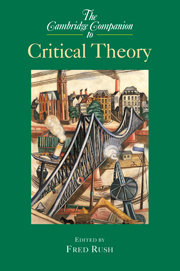Book contents
- Frontmatter
- Introduction
- 1 Conceptual foundations of early Critical Theory
- 2 Benjamin, Adorno, and the decline of the aura
- 3 The dialectic of enlightenment
- 4 The marriage of Marx and Freud
- 5 Dialectics and the revolutionary impulse
- 6 “The dead speaking of stones and stars”
- 7 Critique, state, and economy
- 8 The transcendental turn
- 9 The politics of Critical Theory
- 10 Critical Theory and the analysis of contemporary mass society
- 11 Critical Theory and poststructuralism
- 12 The very idea of a critical social science
- 13 A social pathology of reason
- Select bibliography
- Index
13 - A social pathology of reason
on the intellectual legacy of Critical Theory
Published online by Cambridge University Press: 28 May 2006
- Frontmatter
- Introduction
- 1 Conceptual foundations of early Critical Theory
- 2 Benjamin, Adorno, and the decline of the aura
- 3 The dialectic of enlightenment
- 4 The marriage of Marx and Freud
- 5 Dialectics and the revolutionary impulse
- 6 “The dead speaking of stones and stars”
- 7 Critique, state, and economy
- 8 The transcendental turn
- 9 The politics of Critical Theory
- 10 Critical Theory and the analysis of contemporary mass society
- 11 Critical Theory and poststructuralism
- 12 The very idea of a critical social science
- 13 A social pathology of reason
- Select bibliography
- Index
Summary
With the turn of the new century, Critical Theory appears to have become an intellectual artifact. This superficial dividing point alone seems to increase the intellectual gap separating us from the theoretical beginnings of the Frankfurt School. Just as the names of authors who were for its founders vividly present suddenly sound from afar, so too the theoretical challenges from which the members of the school had won their insights threaten to fall into oblivion. Today a younger generation carries on the work of social criticism without having much more than a nostalgic memory of the heroic years of western Marxism. Indeed, already over thirty years have passed since the writings of Marcuse and Horkheimer were last read as contemporary works. There is an atmosphere of the outdated and antiquated, of the irretrievably lost, that surrounds the grand historical-philosophical ideas of Critical Theory, ideas for which there no longer seems to be any kind of resonance within the experience of the accelerating present. The deep chasm that separates us from our predecessors must be comparable to that which separated the first generation of the telephone and movie theatre from the last representatives of German idealism. The same vexed astonishment with which a Benjamin or a Kracauer may have observed a photo of the late Schelling must today come over a young student who, on her computer, stumbles across a photo of the young Horkheimer posing in a bourgeois Wilhelmian interior.
- Type
- Chapter
- Information
- The Cambridge Companion to Critical Theory , pp. 336 - 360Publisher: Cambridge University PressPrint publication year: 2004
- 27
- Cited by



